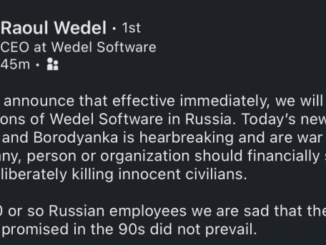
WBU Statement on Ukraine and Freedom of the Press
The World Broadcasting Unions (WBU), a coordinating body for broadcasting unions who represent broadcaster networks across the globe, has issued the following statement on the conflict between Russia and Ukraine.“As the situation between Russia and Ukraine escalates, access to trusted, factual, and impartial information is more critical than ever.All media broadcasters and the World Broadcasting Unions’ members are focused on doing our job for the public in difficult circumstances and we will not hesitate to condemn any infringements or violations of press freedom. It is vital for journalists to be allowed to continue to operate both freely and safely, and report without hindrance. Supporting media freedom must be prioritized, not despite these challenging circumstances, but because of them.” The statement comes as Kremlin clamps down on social media and threatening to muzzle outspoken independent news outlets. Independent radio station Ekho Moskvy was closed last week and TV Rain, an independent radio station suspended operations after receiving threats of closure from the authorities as Russian officials demand that the country’s media cover the Ukraine invasion in strict accordance with the official line.In further crackdown on dissenters and western social media, police in Moscow are stopping people in the streets to go through their phones and screening their text messages and phones.Media covering the invasion in Ukraine is not safe either, as a team of Sky News reporters narrowly escaped a violent ambush by Russian saboteurs near Kyiv, the Ukrainian capital.Various media broadcasting organisations have responded by discontinuing their operations in Russia.Major broadcast software company Adthos has cut ties with Russia, where it has conducted much of its R&D over the years. Spotify has closed its Russia office indefinitely and also removed all content from state media RT and Sputnik from its platform in the European Union, the United States and other markets around the world, except for Russia. Similar steps have been taken by Facebook and Twitter. […]





